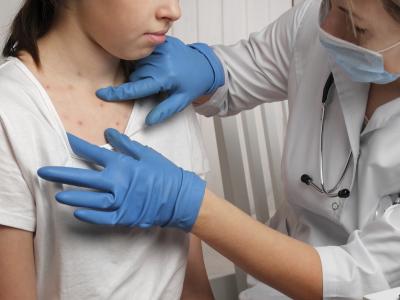Dec 2, 2009
College flu cases declined over holiday break
Flu activity at US colleges showed another steep decline last week, though the Thanksgiving break may account for some of the decrease, the American College Health Association (ACHA) reported today. New cases were down 69% from the previous week. One more death was reported, raising the total to three. The attack rate for the week ending Nov 27 was 4.1 cases per 10,000 students. So far 84% of institutions reporting had received pandemic vaccine, but only 5% of students have been vaccinated.
http://www.acha.org/ILI_LatestWeek.cfm/?date=120209
ACHA report for week ending Nov 27
CDC warns about vaccine e-mail scam
The US Centers for Disease Control and Prevention (CDC) yesterday warned about an e-mail scam that claims people age 18 and older need to create a personal profile as part of a purported "state vaccination program." The CDC said clicking on the e-mail link could install a harmful computer virus and advised users to avoid unsolicited links and use caution when sharing personal information.
http://www.cdc.gov/hoaxes_rumors.html
Dec 1 CDC statement
More liquid Tamiflu for kids on its way
Roche said today it has begun shipping more supplies of liquid Tamiflu (oseltamivir) for children to help ease shortages related to the flu pandemic. The company said shipments would continue into 2010 but didn't list quantities. "Pharmacy stock of the oral suspension will continue to be spotty until we are able to get all the shipments out to meet the current orders," Roche spokeswoman Tara Cooper told CIDRAP News. She voiced confidence the firm would be able to meet demand during the winter.
http://www.rocheusa.com/portal/usa/press_releases_nutley
Roche USA press releases
New Mexico reports higher flu deaths in American Indians
New Mexico is reporting a disproportionate number of pandemic flu deaths in American Indians, the Associated Press (AP) reported today. State epidemiologist Mike Landen said the group makes up 10% of the state's population but accounts for 20% of its flu deaths. He said reasons might include higher diabetes and poverty rates and lack of access to medical care. Of 40 deaths, 8 were in American Indians. Five were adults who had underlying conditions.
http://www.daily-times.com/ci_13905775
Dec 2 AP story
Polish official seeks probe of vaccine policy
Poland's top civil-rights official has asked prosecutors to investigate the Polish government for refusing to import pandemic flu vaccine, the Canadian Press reported. The official, Janusz Kochanowski, said refusal to order vaccine is endangering public health. Prime Minister Donald Tusk's administration has said it won't import vaccine unless producers take responsibility for any side effects.
http://www.google.com/hostednews/canadianpress/article/ALeqM5i5EMJ3KHjK1xlfLpgJE0QxvgTmkQ
Dec 1 Canadian Press story
Good results reported for VLP H1N1 vaccine
Novavax Inc. today reported good initial results in the first stage of a phase 2 trial of its virus-like-particle (VLP) vaccine for pandemic H1N1 flu. One thousand healthy adults received two doses of 5, 15, or 45 micrograms. A review of findings in 500 participants 14 days after the first dose showed that the vaccine was well tolerated and that antibody responses to the two higher doses met the criteria of regulatory agencies. Novavax plans to pursue registration of the vaccine in Mexico.
http://www.prnewswire.com/news-releases/novavax-reports-positive-clinical-results-from-pivotal-study-of-h1n1-influenza-vaccine-in-mexico-78308117.html
Dec 2 Novavax press release
Japan: Abnormal behavior in young patients
Japan's health ministry says that 151 flu patients under age 18 showed abnormal behavior, such as "acting violently or uttering gibberish," between late September and early November, Kyodo News reported today. Most of the patients were believed to have the pandemic virus; 62 were receiving oseltamivir or zanamivir, but some were not on an antiviral. Reports from Japan in recent years have suggested that the use of neuraminidase inhibitors may lead to unusual behavior in children and adolescents.
http://search.japantimes.co.jp/cgi-bin/nn20091202a6.html
Dec 2 Kyodo News report


















